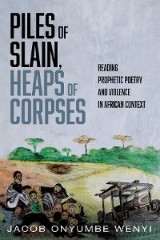Details

Piles of Slain, Heaps of Corpses
Reading Prophetic Poetry and Violence in African Context|
29,99 € |
|
| Verlag: | Wipf And Stock Publishers |
| Format: | EPUB |
| Veröffentl.: | 02.06.2021 |
| ISBN/EAN: | 9781725268326 |
| Sprache: | englisch |
| Anzahl Seiten: | 224 |
DRM-geschütztes eBook, Sie benötigen z.B. Adobe Digital Editions und eine Adobe ID zum Lesen.
Beschreibungen
Piles of Slain, Heaps of Corpses reads the violence in the book of Nahum against the background of the war in the Democratic Republic of the Congo and tries to show how this violent book can be therapeutic and transformative for wounded communities. Here Jacob Onyumbe views Nahum through four scholarly lenses: poetic analysis, study of Assyrian iconography related to eighth- and seventh-century Judah, ethnographic research among survivors of war in the Democratic Republic of the Congo, and modern studies on the impact of war trauma on communities of survivors. He argues that Nahum uses lyric poetry so as to evoke in seventh-century BCE Judahite audiences the memory of war and destruction at the hands of the Assyrians. The prophet uses poetry to evoke (rather than narrate) in order to bring comfort to his audience by revealing the powerful presence of God in the conditions of traumatic violence. Viewed thus, the book of Nahum cannot be dismissed (as has commonly been the case among both scholars and general readers) as irrelevant or merely vindictive. On the contrary, this book--with its depiction of a vengeful God and repulsive war scenes--is essential, especially for traumatized communities.
Jacob Onyumbe Wenyi, a Roman Catholic priest of the diocese of Tshumbe (D.R. Congo), is Associate Professor of Peace Studies at the University of Notre Dame at Tshumbe and Professor of Hebrew and Old Testament at the Saint John Paul II Major Seminary at Lodja (D.R. Congo).
“In his book,
<i>Piles of Slain, Heaps of Corpses</i>, Jacob Onyumbe Wenyi provides a splendid example of contextual interpretation of biblical texts. . . . The brutal imagery of the prophetic book of Nahum provides Onyumbe with echoes and evocations of traumatic realities in the Democratic Republic of Congo and also with ingredients needed for reconciliation. Written with clarity, passion, and methodological precision, Onyumbe’s book belongs in the hands of scholars, graduate students, and clergy.”
<br>
<br> —Kathleen M. O’Connor, Columbia Theological Seminary
<br>
<br>
<br>
<br> “In recovering a redemptive interpretation of the poetry that is the book of Nahum using socio-historical resources, Jacob Onyumbe Wenyi offers African (and other) readers another biblical voice speaking into contexts that yearn for voices of reconciliation rather than voices of violence. A particular contribution of this book is its attention to trauma theory, facilitating a dialogue between ancient biblical contexts circumscribed by trauma and contemporary African contexts saturated in centuries of colonial and neo-colonial trauma.”
<br>
<br> —Gerald West, University of KwaZulu-Natal
<br>
<br>
<br>
<br> “Onyumbe’s book casts a new light upon the book of prophet Nahum. It combines a traditional approach with modern examples of violence. . . . The book is a good contribution to modern scholarship, and I hope it will get a wide distribution.”
<br>
<br> —Peter Dubovsky, Pontifical Biblical Institute
<br>
<i>Piles of Slain, Heaps of Corpses</i>, Jacob Onyumbe Wenyi provides a splendid example of contextual interpretation of biblical texts. . . . The brutal imagery of the prophetic book of Nahum provides Onyumbe with echoes and evocations of traumatic realities in the Democratic Republic of Congo and also with ingredients needed for reconciliation. Written with clarity, passion, and methodological precision, Onyumbe’s book belongs in the hands of scholars, graduate students, and clergy.”
<br>
<br> —Kathleen M. O’Connor, Columbia Theological Seminary
<br>
<br>
<br>
<br> “In recovering a redemptive interpretation of the poetry that is the book of Nahum using socio-historical resources, Jacob Onyumbe Wenyi offers African (and other) readers another biblical voice speaking into contexts that yearn for voices of reconciliation rather than voices of violence. A particular contribution of this book is its attention to trauma theory, facilitating a dialogue between ancient biblical contexts circumscribed by trauma and contemporary African contexts saturated in centuries of colonial and neo-colonial trauma.”
<br>
<br> —Gerald West, University of KwaZulu-Natal
<br>
<br>
<br>
<br> “Onyumbe’s book casts a new light upon the book of prophet Nahum. It combines a traditional approach with modern examples of violence. . . . The book is a good contribution to modern scholarship, and I hope it will get a wide distribution.”
<br>
<br> —Peter Dubovsky, Pontifical Biblical Institute
<br>

















